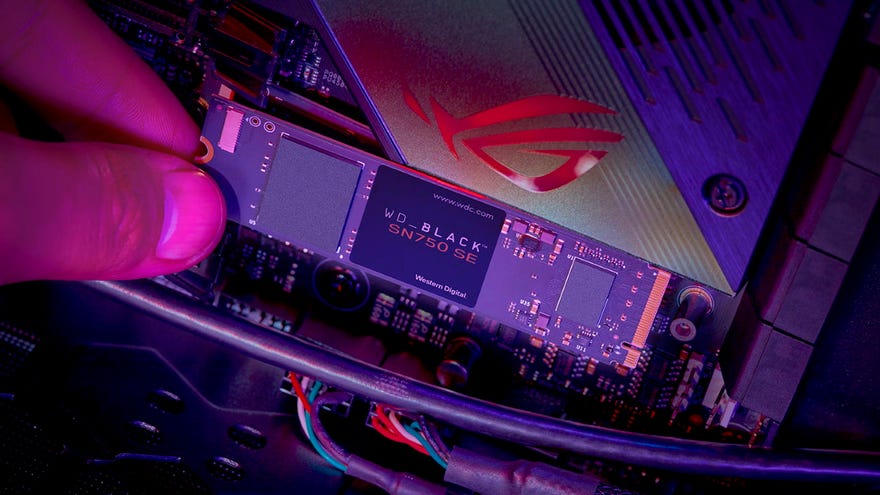WD's Black SN750 SSD is getting a PCIe 4.0 version
The SN750 SE will be arriving this June, but I also don't really know why it exists
Western Digital have announced they've got a new gaming-focused NVMe SSD on the way, the WD Black SN750 SE. Rather confusingly, it's a PCIe 4.0 version of their flagship PCIe 3.0 drive, the WD Black SN750, which isn't going to cause any problems figuring out which one is which in the slightest, no sir.
First, some headline specs. It's going to be available in 250GB, 500GB and 1TB size capacities when it launches this June, hitting a top sequential read speed of 3600MB/s. The Black SN750 SE is also more power efficient than its SN750 predecessor, drawing up to 30% less power. Since it's one of WD's Black SSDs, you'll also be able to use WD's Black SSD Dashboard software to enable its special gaming mode and keep an eye on its overall health and endurance. Prices will start at £57 in the UK, going up to £86 for the 500GB model and £167 for the 1TB version (US pricing TBC).
In short, the main idea behind it is that it's meant to be a more affordable kind of PCIe 4.0 SSD, allowing gamers to still get the benefit of things like faster loading times without shelling out mega bucks for a more premium kind of PCIe 4.0 drive like their flagship WD Black SN850 SSD.
It all sounds like very good stuff on paper, but when you take a closer look at both its price and the kinds of speeds it's offering, something doesn't add up. That top sequential read speed of 3600MB/s, for example? That's not actually that much faster than a lot of the best PCIe 3.0 NVMe SSDs these days. Heck, Samsung's 970 Evo Plus and 980 SSD are both rated for a top sequential read speed of 3500MB/s, while the regular WD Black SN750 can supposedly hit a maximum of 3470MB/s. Proper PCIe 4.0 SSDs, meanwhile, like WD's own Black SN850, are rated for up to 7000MB/s sequential read speeds.
That's quite a big difference, and it makes me wonder just how well the Black SN750 SE will perform during everyday use. Who know, perhaps it will surprise me with some super fast random read and write speeds that put in it on a more level playing field with some of the other PCIe 4.0 SSDs I've tested recently, but it's still a bit eyebrow-raising to say the least.
Indeed, when questioned about ithe SN750 SE's speed figures in our press briefing yesterday, WD said this:
"What we've done with the Gen 4 controller allows us to optimise on the affordability of the product and the construction of the product. It's a single-sided design, there's just the controller and a block of NAND, it's DRAM-less, so that again allows you to reduce the cost. A Gen 3 solution like the SN750 was also using 8 lanes from the controller outbound to the NAND. The Gen 4 controller uses four lanes out to the NAND, but because they're Gen 4, they're higher power and higher bandwidth lanes. That allows us to get about 3650MB/s on the reads over the 3500MB/s on the SN750. So you're getting slightly better performance, and actually better performance on the IOPS, which is very important when you're doing all the [game] level load stuff, so you'll get a bump in load speeds. So you're getting better performance than Gen 3 by virtue of using a Gen 4 controller, you're getting lower power because it's optimised, and the affordability, is really what it comes down to in the end.
That may be true, but when you can currently grab a 500GB WD Black SN850 for £90 in the UK, an £86 SN750 SE doesn't scream good value in the slightest. It's also quite a bit more expensive than the regular SN750, too. Whereas an SE will set you back £57 for 250GB, the PCIe 3.0 model costs just £44 right now (which, incredibly, already has a picture of the SE on its Amazon product page instead of the regular SN750).
As I said, I'll reserve full judgment until I can get one in for testing, but right now, I'm struggling to see why anyone would go for it.


